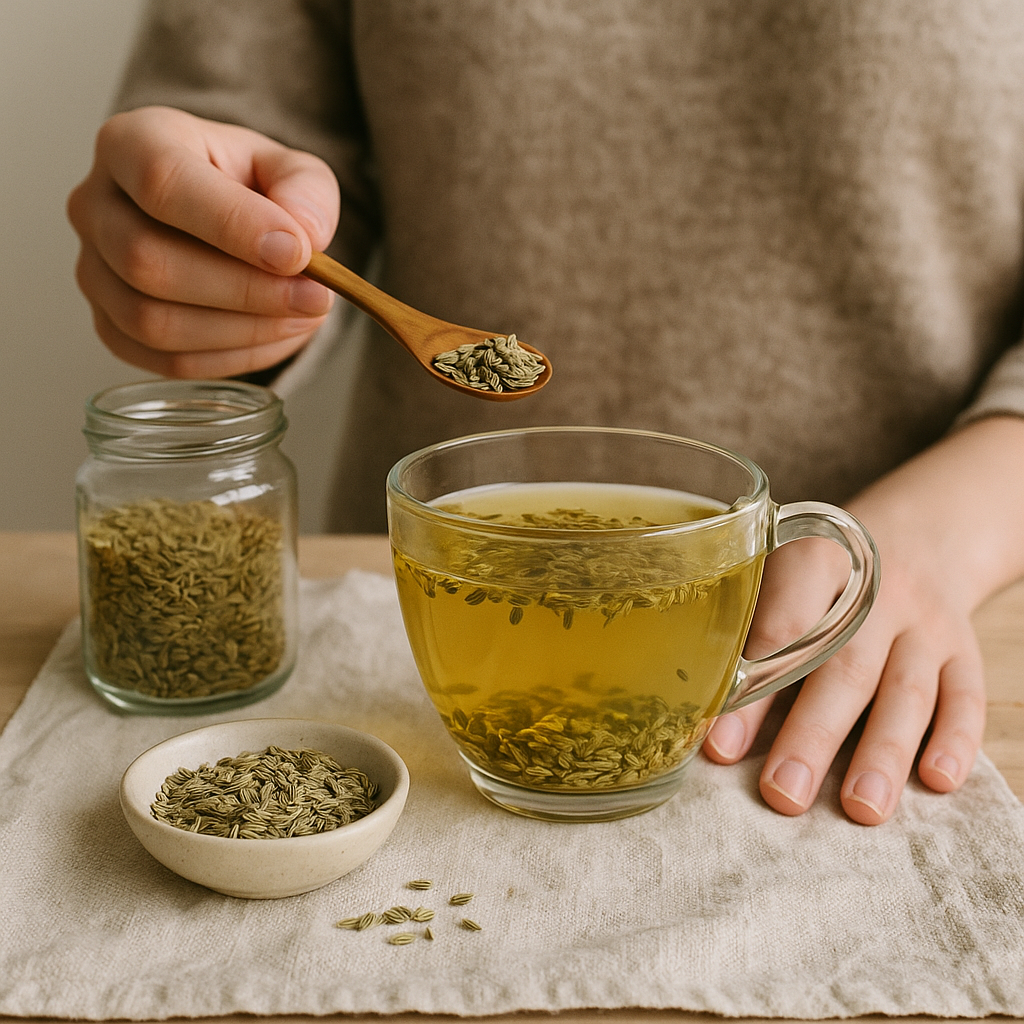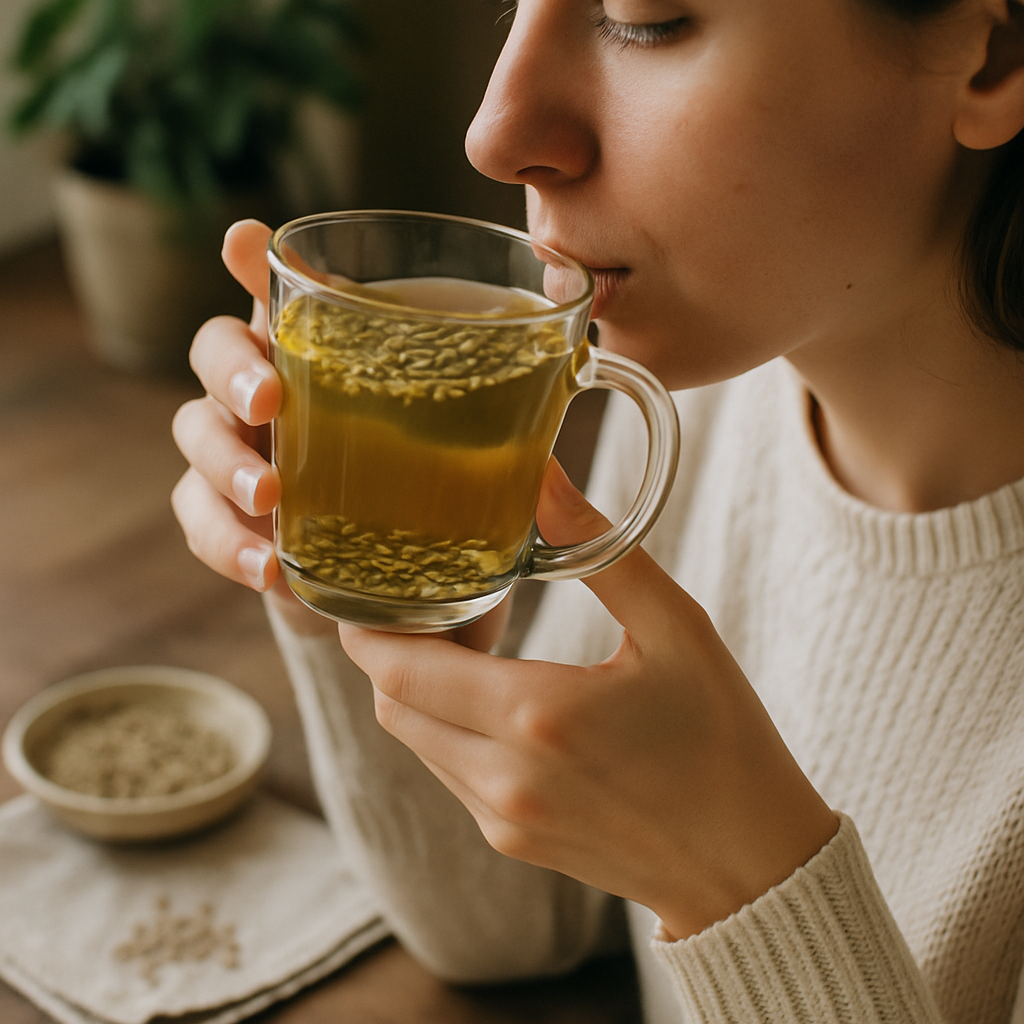Ask Ayurvedic doctor a question and get a consultation online on the problem of your concern in a free or paid mode. More than 2,000 experienced doctors work and wait for your questions on our site and help users to solve their health problems every day.
How to Make Fennel Tea: Recipes, Benefits, and Ayurvedic Insights

If you’ve ever wondered how to make fennel tea at home, you’re not alone. This soothing herbal drink has been enjoyed for centuries for its calming, digestive, and even hormonal-balancing properties. Learning a simple fennel tea recipe or two can be a life-saver, especially if you’re dealing with gas, bloating, or those stubborn days of indigestion. What’s even better is that fennel tea recipes are easy to prepare, require just a few ingredients, and can be made using either dry fennel seeds or fresh fennel bulbs. Once you know how to prepare fennel tea, you’ll see it’s not only a healthy beverage but also a ritual that connects you with Ayurvedic wisdom and natural healing traditions.
So, whether you’re curious about a classic fennel seeds tea recipe, want to know how to make fennel tea from fresh fennel, or are simply searching for a fennel tea recipe for gas relief, you’re in the right place. Let’s dive deeper into what makes this tea so special.

Fennel Tea in Ayurveda and Traditional Healing
In Ayurveda, fennel seeds—known as Saunf—are considered a powerful herb for balancing the digestive fire, or Agni. This is why after-meal fennel chewing is such a common tradition in India. According to Ayurvedic texts, fennel seeds help reduce bloating, improve nutrient absorption, and even calm the mind.
But fennel tea is not just a digestive aid. It’s often recommended as a cooling drink for balancing Pitta dosha, the fire element in the body. Women also use fennel tea for periods to ease cramps and promote hormonal harmony, while others rely on fennel tea for constipation relief. In Unani and traditional Chinese medicine too, fennel tea holds a similar spot as a gentle yet effective home remedy.
Basic Fennel Tea Recipes
Now, let’s get practical. If you’re thinking about fennel tea how to make it at home, the good news is you don’t need fancy equipment or rare ingredients. All you need is fennel—seeds or fresh—and hot water. Below are two simple fennel tea recipes you can try today.
Fennel Tea Recipe with Dry Seeds
This is probably the most common way people learn how to make fennel seeds tea.
Ingredients:
-
1 teaspoon fennel seeds
-
1 ½ cups water
-
Optional: honey, lemon slice
Method:
-
Lightly crush the fennel seeds to release their essential oils.
-
Bring water to a boil, then add the seeds.
-
Let simmer for 5 minutes (some people prefer 7, but not too long or it gets bitter).
-
Strain, pour into a cup, and sweeten with honey if desired.
And there you go, your first fennel seeds tea recipe, ready in under 10 minutes.
How to Make Fennel Tea from Fresh Fennel
Wondering how to make fennel tea from fresh fennel? It’s just as simple.
Ingredients:
-
½ bulb fresh fennel (thinly sliced)
-
1 ½ cups water
-
Small piece of ginger (optional for warmth)
Method:
-
Slice the fennel bulb into thin strips.
-
Add it to boiling water and simmer for 8–10 minutes.
-
Strain and serve warm.
Fresh fennel tea tastes lighter and a bit sweeter than seed-based tea. Many people say it feels gentler on the stomach too.

Variations of Fennel Seeds Tea Recipe
Once you know the basics, you can adapt fennel tea recipes for specific health needs. From easing digestion troubles to calming menstrual cramps, fennel seeds tea has been a trusted home remedy for generations. Let’s explore a few powerful variations.
Fennel Tea Recipe for Gas and Digestion
Gas and bloating…ugh, they’re uncomfortable and sometimes even embarrassing. Luckily, fennel tea is well-known in Ayurveda for reducing these issues. Here’s a simple fennel tea recipe for gas:
Ingredients:
-
1 teaspoon fennel seeds
-
½ teaspoon cumin seeds
-
½ teaspoon carom seeds (ajwain)
-
2 cups water
Method:
-
Add all seeds to boiling water.
-
Simmer for 7–8 minutes until the aroma is strong.
-
Strain and sip slowly after meals.
This blend works as a digestive powerhouse. Fennel relaxes intestinal muscles, cumin improves metabolism, and ajwain fights bloating. If you’re learning how to prepare fennel tea for digestion, this is one of the best recipes.
Fennel Tea for Constipation Relief
Dealing with constipation can make anyone cranky. Drinking fennel tea for constipation is a natural way to encourage smoother bowel movements.
Ingredients:
-
1 ½ teaspoon fennel seeds
-
½ teaspoon flaxseeds (optional, for extra fiber)
-
2 cups water
Method:
-
Crush fennel seeds gently.
-
Add fennel and flaxseeds to boiling water.
-
Simmer for 6 minutes, then strain and serve.
The soluble fiber in fennel, combined with its mild laxative effect, makes this a gentle yet effective herbal tea for constipation. Add honey if you want a slightly sweet taste—it also soothes the stomach lining.
Fennel Tea for Periods and Hormonal Balance
Many women swear by fennel tea for periods because it helps with cramps, bloating, and mood swings. It’s believed fennel contains plant-based compounds that mimic estrogen, supporting hormonal balance.
Ingredients:
-
1 teaspoon fennel seeds
-
1 small stick of cinnamon
-
2 cups water
Method:
-
Boil water, then add fennel seeds and cinnamon.
-
Simmer for 10 minutes.
-
Strain and drink warm, ideally 2–3 days before your cycle begins.
The combination of fennel and cinnamon provides warmth and relaxation. While research is still evolving, many women find it genuinely soothing. Some say it even reduces the intensity of cramps after a couple of cycles.
How to Make Fennel Tea for Daily Use
Knowing fennel tea how to make it is one thing. But figuring out how to use it daily is another. The good news? It’s flexible, easy, and fits naturally into your routine.
Fennel Tea: How to Make It Correctly
A common mistake is boiling fennel too long, which makes it taste bitter. Instead, always simmer gently, around 5–8 minutes, and strain before drinking. For those experimenting with how to make fennel tea at home, try mixing fennel with mint or ginger for variety.
How Much Fennel Tea to Drink and When
There’s no strict rule, but 1–2 cups a day is usually safe. One in the morning to kickstart digestion, another after dinner to prevent heaviness. Avoid drinking too much (say 5–6 cups) because fennel does have a mild estrogenic effect, and too much of anything isn’t ideal.
Health Benefits of Drinking Fennel Tea
Beyond digestion and hormones, fennel tea brings a whole bunch of other benefits. Let’s look at some of the most notable ones.
-
Relieves bloating and indigestion: Fennel tea relaxes the muscles of the gastrointestinal tract, making it easier for gas to pass. That’s why so many people turn to fennel tea recipes for quick relief after heavy meals.
-
Supports liver health: According to some herbalists, fennel has detoxifying properties that help the liver flush out toxins more effectively.
-
Boosts immunity: Fennel is rich in antioxidants like vitamin C, which can support your immune system.
-
Reduces inflammation: Compounds in fennel, like anethole, have anti-inflammatory effects, which may help with everything from sore throat to mild joint pain.
-
Improves sleep: Many people find a warm cup of fennel tea before bed helps them unwind and sleep better. Just be sure not to overdo it, or you’ll be waking up for bathroom trips in the middle of the night.
While research is still growing, the traditional uses of fennel tea show it’s more than just a tasty herbal drink—it’s a full-body support system in a cup.
Conclusion
By now, you should have a clear idea of how to make fennel tea, whether from dry seeds or fresh fennel. We’ve walked through a basic fennel tea recipe, variations for digestion, constipation, and periods, plus tips for daily use.
What makes fennel tea special is not just its taste, but its versatility. It’s a humble drink that fits into almost any lifestyle. Whether you’re new to herbal teas or already a fan, trying different fennel tea recipes can help you discover what works best for your body.
So, next time your stomach feels off, or you just want something calming, why not brew a warm cup of fennel tea? Share these recipes with your friends and family—they might thank you for it.
And remember, if you ever forget the exact steps for how to make fennel tea at home, you can always come back to this guide.
FAQs
Q: Can fennel tea help with constipation?
Yes! Fennel tea for constipation is a gentle, natural remedy. It helps relax the bowel muscles and adds mild fiber, which can support smoother digestion. Drinking a warm cup in the morning may help kickstart your system.
Q: Is fennel tea good for periods and cramps?
Definitely. Many women use fennel tea for periods to ease cramps and bloating. Its mild estrogen-like compounds can help balance hormones and reduce menstrual discomfort. Just don’t rely on it as a sole treatment if your symptoms are severe.
Q: How to make fennel tea taste better?
If you find plain fennel tea a bit too earthy, try adding honey, a squeeze of lemon, or even a pinch of cinnamon. You can also mix fennel with mint or ginger for a more complex flavor. Experiment and see what you like best.

